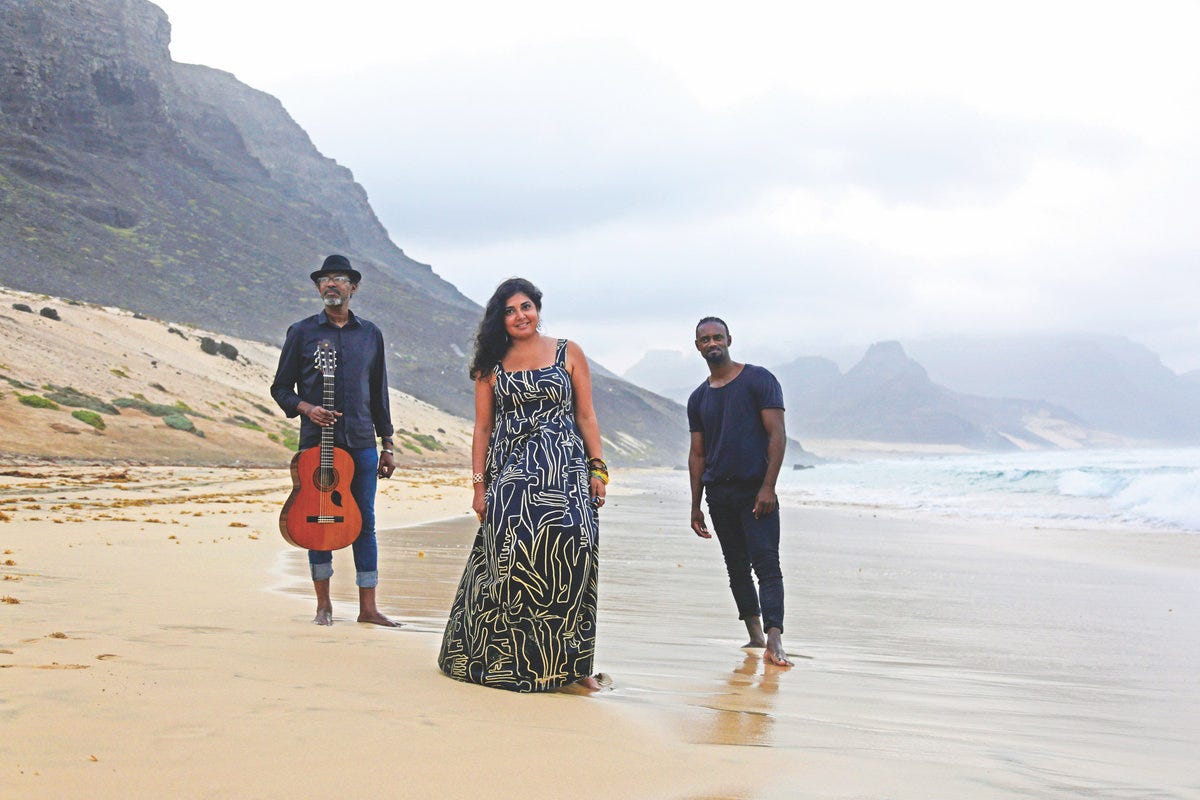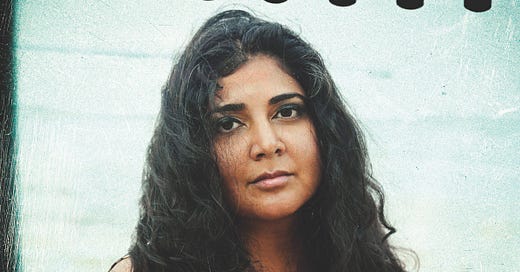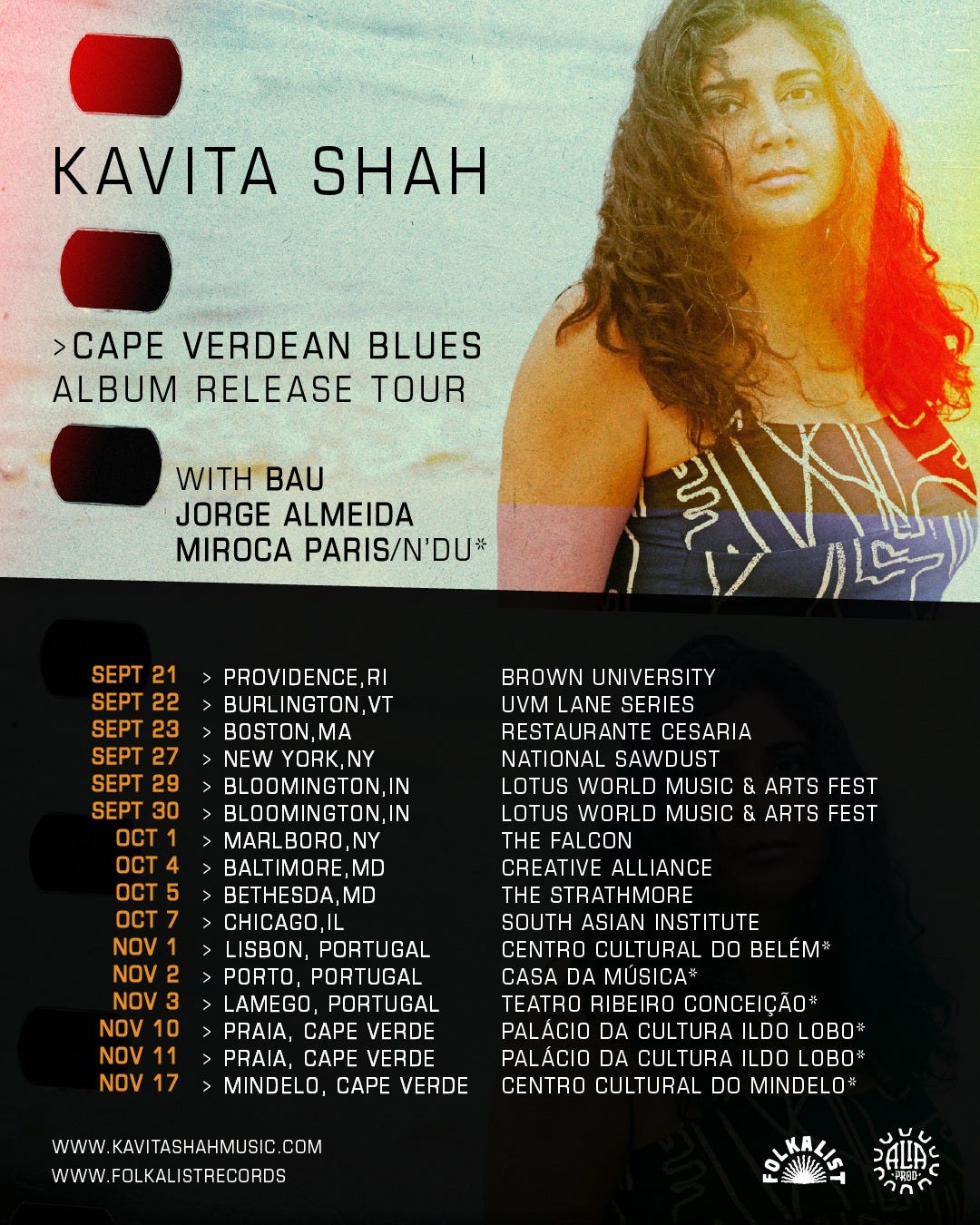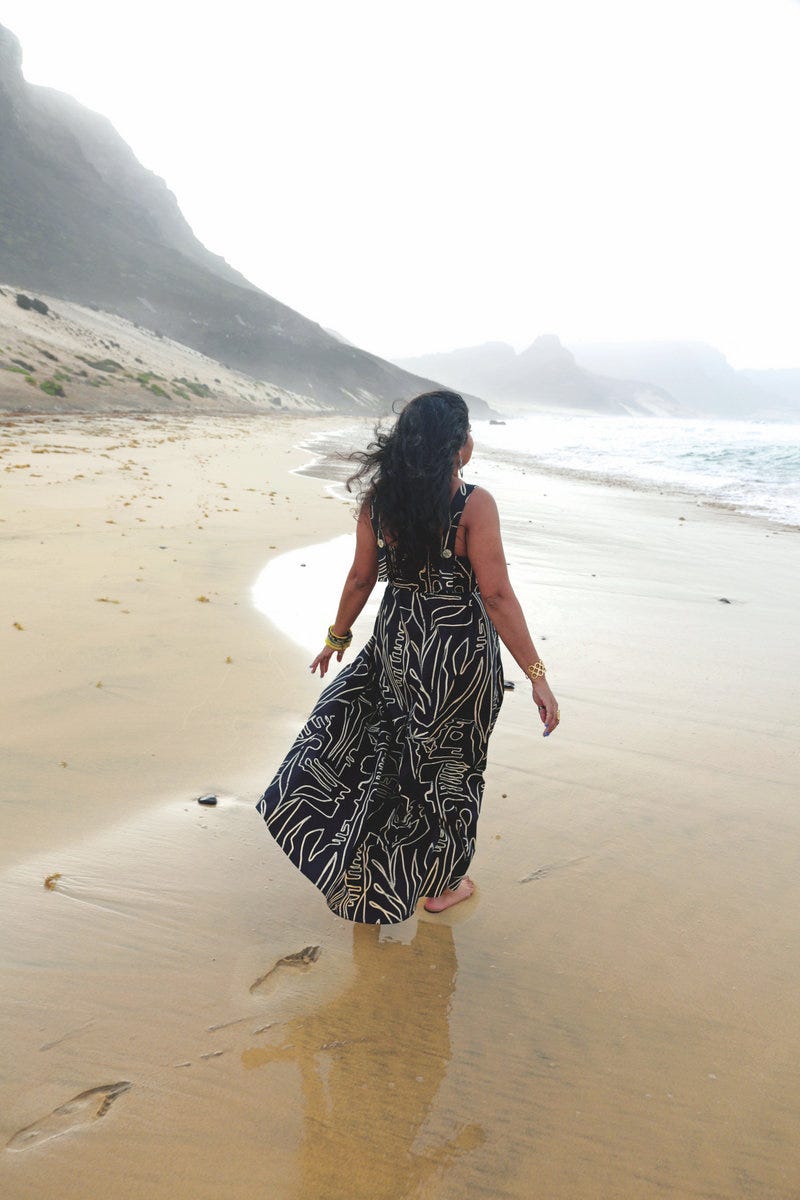Kavita Shah’s ‘Cape Verdean Blues’
Inspired by (Sao Vicente) island vibes and Grammy-winning native daughter Cesaria Evora

“I have been through a lot of loss. It marks who I am. But we can all relate to the fleetingness of life, that is universal. My hope for this album is that it brings people a sense of comfort — the same feeling I had when I first heard Cesária’s voice.”
In many ways, New-York-City-based singer-songwriter Kavita Shah’s new album is a release.
Of reverberating emotion following the loss of loved ones — her father and three of her four grandparents — during a tremulously conceptual period early on in her pivotal career, living on her own. Of stifling labels as a part of the indigenous Other (she is of Indian descent). Of gratitude for the natural landscape-to-vibe rhythms of Cape Verde just off West Africa, and its native daughter, Grammy-winning singer-songwriter Cesária “Cize” Évora GCIH.
Cape Verdean Blues (Folkalist Records) features 12 eventide tunes — traditional mornas and coladeiras, with the yearning, searching, free-spirited feeling of Évora’s sodade in several languages, including Cape Verdean Kriol, Shah’s native Indian-Gujarati, and Portuguese— augmented by vocalese, percussive, mirrored, wordless hauntings, and the authentic island-vibe instrumentation of musicians who’ve worked with Évora on many occasions: co-collaborator/master guitarist/multi-instrumentalist (cavaquinho, ukulele), Rufino “Bau” Almeida, “island rhythm innovator” percussionist Miroca Paris, and vocal protégé Fantcha.
Also on the record, available now on Bandcamp, to lend the air of being there: special guest — Moroccan gnawa master Maalem Hassan Benjaafar, bassists Zé Paris (“Joia”) and Alune Wade (“Chaki Ben”), and percussionists Fernando Saci and Rogerio Boccato (“Flor De Lis”).
Shah sings, as well as performs vocal percussion/clarion and scatting, in loving honor of Cape Verde and her lifelong idol.
“In this paradise in the middle of the Atlantic Ocean, I found a sense of home that has eluded me for much of my 37 years,” Shah explained in press for the new album. “When I look back, I realize that upon hearing Cesária’s voice nearly a decade ago, she was summoning me down a path I must continue walking in search of sodade.”
In 2016, the talented, award-winning jazz/world music artist and educator earned quality time on the island of São Vicente, a part of the Atlantic archipelago of Cape Verde, where she ran into the late Évora’s longtime musical director, Bau. Together, they launched into fun, lively, insightful jam sessions, shared later with the public.
Shah would return in 2018 to immerse herself in Cape Verde’s culture and music, on a grant from the Jerome Foundation, and link up musically with the islands’ legendary classical composer Vasco Martins, responsible for “Um Porta Aberte” and “Situações Triangulares.”
“What struck me about [Cesária] was that she was wholly herself. She was barefoot, smoking, drinking, she wasn’t overly smiling or entertaining — she was just delivering the songs. As a person of color, to see a black woman whose main power was her authenticity was transformative. She changed my life.”

The six-year getaway proved fruitful, inside and out…academically, emotionally, and spiritually…resulting in a new album and a new outlook on life. Cape Verdean Blues is, perhaps, her most important accomplishment — a great leap forward on equal parts technique and feel, an intuitive next step — always waiting, simmering beneath the surface of her Visions debut with guitarist Lionel Loueke.
A loving tribute, sure. But also, a realizing of Shah’s own original voice, willowy, yet strong, magnified by grief, open insurrection, and awestruck regard for a wise elder who brooked no artifice, performing music on her own terms, with depth, meaning, and a deft right hook…no matter what the rest of the hopeless Top 40 world was worshipping with their tin gods and flaccid spells.
Shah early-released “Angola” by Ramiro Mendes on Aug. 18th as a single ahead of the album. Made famous by Évora, the song opens with Shah breathing in quick intakes as inventive vocal percussion, unveiling the rolling waves upon sandy shores and russet hills of an island the late songstress must’ve dreamed of many nights, while stranded in the Southern African nation.
Though Shah sings in another, more mystical language, the insistent, rustling melancholic impression — Évora homesick for the open sea — is clear.
“‘Angola’ is one of my favorite songs of Cesária’s,” opined Shah. “I always thought it was a party song (the Kriol lyrics say, ‘Angolans, you guys really know how to have fun, but please don’t kill me, I have to leave in the morning!’). But when Bau and I crafted this mysterious arrangement, little were we aware of the double-entendre of these words, as the song is told from the perspective of a Cape Verdean living in Angola during the civil war who doesn’t want to die far from home…and Bau’s solo might be the most beautiful 20 seconds of acoustic guitar I have ever heard (it makes me cry every time).”
Shah’s lyrical, scatting vocals adroitly maneuver around Bau’s plumeria-scented circular guitar rhythms and head-turning, sifting percussive cuts set from a tranquil wave-to-shoreline ruse back to a jostling, slightly jarring pink and blue, open market juxtaposition, Cape Verde to Angola, and back again…a most eruditely clever, mirrored invitation.
“Angola” may bob and weave traces of a storytelling mood in a party flavor, but “Flor Di Nha Esperança [Cape Verdean Folk Song (Unknown)],” a morna blues, sinks soul in the sand, way down deep, and just sits there, gazing at the beauty all around, as encapsulated in the gathering, trinkling notes. Bau does not disappoint here, a nice counterbalance to the yearning uprising in Shah’s warm, velvety voice wanting so very much to float away.
“That song took four years to get right — I felt like Cesária was trying to teach me something. I had to study her phrasing, but also unlock something in me to access all the losses I’ve endured in my personal life in the past few years,” Shah described.
“Joia” by Boy Gé Mendes bounces around on vocals and guitar, reminiscent of every fond childhood skipping hopscotch merry-go-round game, from Mexico to Brazil, to Korea and Japan. Shah stretches her scatting prowess, acting as the lyrical stanza and choral punch, while Bau swirls communal cocktails at her feet. Somehow, together, the duo revisits every good time in every laidback island getaway, whether lost in Poʻipū or Maceió.
“Um Abraço Di Morabeza,” a song composed by Morgadinho and Shah, introduces the lower, contrasting registers of Fantcha. As she caresses every last trenchant note, Fantcha’s voice becomes almost translucent whiskey, craggy and well-worn with melodramatic, draping waves and the slightly acidic liquor of character in tragedy.
“Amor Di Mundo” by Teofilo Chantre could be played alongside Jobim’s greatest hits, as Shah — in vocals and scatting — lights up the darkness with smooth, flowing highway ease, a gentle vocal-guitar ebb and flow, gilded by twinkling-star gleam and go…a gathering and letting go of worries, both she and Bau sturm und drang, storm and flurry, drawing up the tension before breathy release.
“Flor De Lis” by Djavan would also fit next to Jobim’s Brazilian classics of the ‘60s, based on the cute curls of Bau on guitar, picking and choosing his events from his asides. Shah’s voice has never sounded better, more established and fancy-free, laying down the law, while stirring up the goodies, amidst the percolating Brazilian hoots and whistles known and beloved by an entire Boomer Generation, raised on melody and harmonic differences of a jazz reaching out to a world music audience.
On “Situações Triangulares” by Vasco Martins, Shah trades sassafras tête-à-têtes with guitarist Bau, ever on a rising, trickling tempo, not bothering with situational convexes or wordy specifics, leaving meaning to mood, as inspiration hits. A neat fade has the vocalist vibing with the reedy hoots of a semantic rainforest seascape.
“This album is my most personal yet, as it is about diaspora and loss, two things I carry with me every day. I look forward to sharing with you more stories about my journey with this music in the coming months!”
“Cize” [Joaquim Almeida Morgadinho] plays like a memorial, in solemn, ginger steps toward some unknown, far away altar, the day the great dame of sodade passed away. Shah sings as if bearing a great weight, a welcome burden, anything to ease the suffering of those who truly knew and lost what they had, while Cesária “Cize” Évora, “Queen of the Morna,” walked this earth — barefoot.
But comparatively, with a lightness of being and untainted-innocence in one so young, with her entire life ahead of her, to make of it what she will.
“Chaki Ben [Gujarati Folk Song (Unknown)]” comes from Shah’s childhood. It is a song she used to sing with her parents. For some reason, it sounds so crazy-familiar. Maybe the Indian lullaby made the rounds, along with many world music folk songs parents the world over would croon to their fussy babies during the curfews of war. She sings the lullaby with a bright, yet vaguely yearnful visage, complete with blanketing, common sensical, mild-mannered vocal aerobics amidst chirping, crulling bird-like sounds, Benjaafar’s guembri, qraqeb, and sanjon rhythms.
“Um Porta Aberta” by Vasco Martins is a sad, wringing, deceptively complex heartbeat ballad that Shah and Bau treat matter-of-factly, without one ounce of excess pity. She touches on soft, painful spots, at vocal ease with hard truths and rounded, lyrical, hair-pin drops, almost too wretchedly hidden, while Bau rings a tapestry of dreamy interlude all around, raining compassion, grace, and justice.
“Sodade” by Amandio Cabral made Évora famous, putting the spotlight on Cape Verdean rhythms and hard-luck, fantastically-laden-stories, carved, turned, and shaped by the voluptuous, emancipating aspects of the sun over endless horizon seas of every island paradise before the time of Capt. Cook.
Shah first performed “Sodade” on her debut record, Visions, in 2014. But without the awareness, understanding, and depth of lived experience. In this version with Bau — who was on the original recording — she does one better, by leaps and bounds, infusing every wordless vocal flight to excruciating heights with grave purity and brilliant dynamic flow. There is no question of Shah’s vocal imperative, maturity, expertise, and vision.
By the time she hits that high note in the fade, she’s reached the pinnacle of her own unique, multi-cultural artistry, hitting home for a lot of the displaced.
Jazz pianist Horace Silver, whose father came from Cape Verde, composed the title track in folksy measures (am I insane, or does the tune sound like that ‘70s airline jingle, “Quantas Quantas Quantas Quantas?”), swooping in like a silver bird on a wing and a prayer, picked up by the gossipy, juggling maestro of featured feathered guest artist Miroca Paris.
His perky, rainbow-toucan-color, brush-stroke animation wonderfully elongates Shah’s spritely, interwoven, clip-art puma-percussive track of sand and sea in a wordless instrumental vocalese that sets the ambient island free.
Aaah…
Next Wednesday, 1 p.m. MDT, Kavita Shah hosts a free listening party for her upcoming release. She and her Cape Verdean Blues bandmates will also tour the world, sharing their Cesária Évora love and inspired musical view of the islands, celebrating sodade in style.
Special thanks to Amanda Bloom of Crossover Media for the head’s up, and Shah, for welcoming me that time in South Seattle…just before she made it big.





